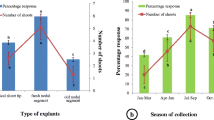Abstract
Triacontanol, a long-chain primary alcohol was found to be an effective growth regulator in the micropropagation of balm, Melissa officinalis. In both the multiplication and the rooting phase, concentrations of 2, 5, 10 and 20 μg triacontanol per liter were applied. After 4 weeks of culture, the fresh weight of shoots was measured in the multiplication phase and root formation, photosynthetic activity, chlorophyll content and the fresh and dry weights of shoots were analyzed in the root induction phase. In the multiplication phase, 5 μg/l triacontanol was found to be the optimal concentration, while in the rooting phase 2 μg/l was the most effective. Triacontanol increased the number and length of roots, and it enhanced shoot growth, fresh weight, and the chlorophyll content, but it had no effect on the dry weight and the photosynthetic activity of the plants. Results of our work demonstrate that triacontanol can be applied as an effective growth regulator in the tissue culture of balm.
Similar content being viewed by others
Author information
Authors and Affiliations
Additional information
Received: 3 December 1997 / Revised: 24 February 1998 / Accepted: 26 February 1999
Rights and permissions
About this article
Cite this article
Tantos, Á., Mészáros, A., Kissimon, J. et al. The effect of triacontanol on micropropagation of balm, Melissa officinalis L.. Plant Cell Reports 19, 88–91 (1999). https://doi.org/10.1007/s002990050715
Issue Date:
DOI: https://doi.org/10.1007/s002990050715




